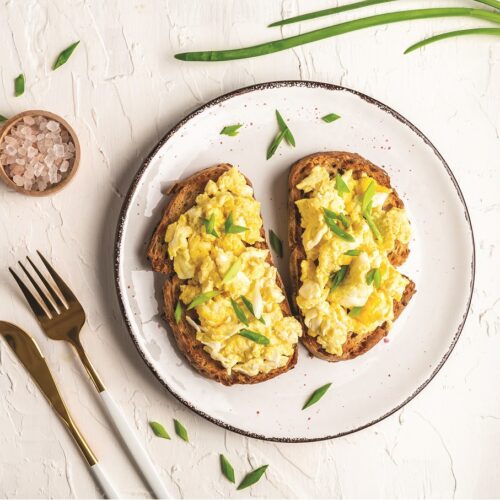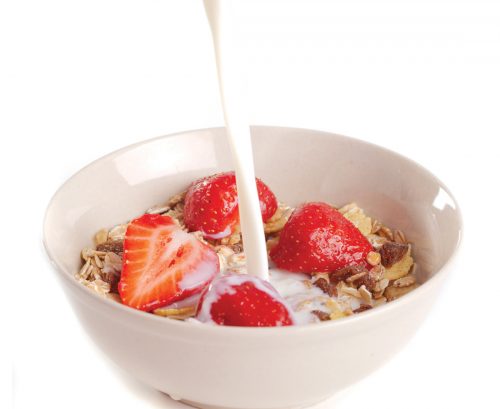
Dairy milk is a great source of important nutrients but, if you have to avoid it, here’s how to pick the best substitutes.
Whether you want to avoid cow’s milk because of food allergies, taste or vegan lifestyle choices, you’re in luck, as there is a wide range of milk alternatives available. Sheep and goat’s milks are similar in nutritional profile to cow’s milk – high in protein and calcium. If you’re avoiding cow’s milk because of allergies, be aware, because they have similar proteins, you are also likely to react to sheep and goat’s milks. They also contain lactose (milk sugars). If it’s the lactose that’s problematic for you, there is a range of lactose-free milks on the market.
We found many milk alternatives readily available in supermarkets, including soy, rice, oat, almond and coconut, some of these in both liquid and powder forms. There’s also an increasing number of flavoured milk alternatives but these are usually higher in sugar. Milk alternatives may work well on cereals or in smoothies, but some can separate in hot drinks.
Plant and nut-based milk alternatives are naturally lower in vitamins and minerals than cow’s milk, so it’s important to look for fortified products. Water is the main ingredient followed, usually, by the plant/nut source. Nut ‘milks’ contain around 2 per cent nuts, rice ‘milks’ around 14 per cent rice and soy ‘milks’ around 4 per cent soy. Other ingredients include oil, sugar and thickening gums.
Here’s how to choose the best plant or nut-based milk alternative for you.
Protein
When replacing cow’s milk, remember it is a good source of protein. Soy ‘milks’ are higher in protein than other milk alternatives, with around 3g-4g protein per 100ml, similar to cow’s milk.
Other milk alternatives are considerably lower in protein, so don’t think of them as a way to add protein to a snack or meal. Lower-protein ‘milks’ won’t be as filling.
For soy-based milk alternatives, we recommend choosing those containing 3g or more protein per 100ml.
Saturated fat
The amount of saturated fat varied considerably in the milk alternatives we found.
Coconut-based alternatives were highest in saturated fat. PureHarvest Coco Quench Coconut Milk contains 2.3g sat fat per 100ml, that’s 5.8g in a 250ml serve. Saturated fat, from either animal or plant sources, has been linked to increased cholesterol levels and risk of heart disease.
If you have coconut-based alternatives every day, think about where else you get saturated fat from, so you don’t overdo it.
We recommend choosing milk alternatives that contain 1g or less saturated fat per 100ml.
Calcium
Cow’s milk provides lots of calcium, which is an essential mineral, important for growing healthy, strong bones in children as well as maintaining bone strength throughout life.
Calcium may only be present in very small amounts in milk alternatives, so it’s important to choose a fortified product.
We recommend choosing a fortified milk alternative that contains 120mg or more calcium per 100ml.
How to choose
Use these criteria to compare ‘milks’
Some different milk alternatives we found:
Any product examples given here were correct at time of publication. However, remember to check the ingredients and nutrition information every so often, as these can change over time
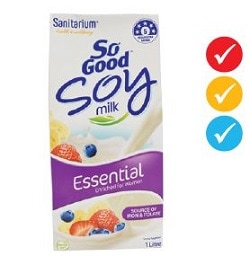
Soy Milk Essential
Cost $3.39 per 1 litre
Per 100ml: 219kJ, 3.3g
protein, 0.2g sat fat,
160mg calcium, $0.34
Tastes quite different. A slightly sweet, vanilla flavour
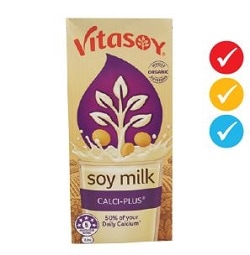
Soy Milk Calci-Plus
Cost $3.49 per 1 litre
Per 100ml: 269kJ, 3.2g
protein, 0.4g sat fat,
160mg calcium, $0.35
A sweet, nutty flavour with a creamy texture
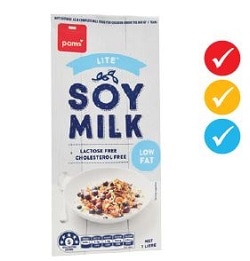
Lite Soy Milk
Cost $2.49 per 1 litre
Per 100ml: 190kJ, 3.3g
protein, 0.2g sat fat,
120mg calcium, $0.25
Tastes quite similar to cow’s milk
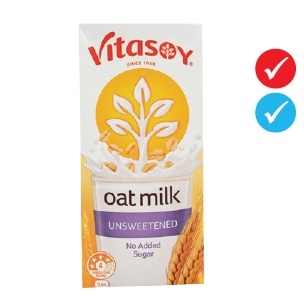
Oat Milk Unsweetened
Cost $4.19 per 1 litre
Per 100ml: 298kJ, 1g protein,
0.3g sat fat, 120mg calcium,
$0.42
A neutral flavour that would go well on a breakfast cereal
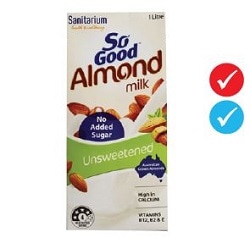
Almond Milk
Unsweetened
Cost $4.40 per 1 litre
Per 100ml: 69kJ, 0.6g
protein, 0.1g saturated fat,
120mg calcium, $0.44
A light tasting drink. Would be great for cereals or smoothies
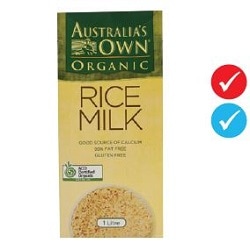
Organic
Rice Milk
Cost $3.29 per 1 litre
Per 100ml: 209kJ, 0.4g
protein, 0.1g saturated fat,
120mg calcium, $0.33
A nice, nutty flavour. Slightly sweet
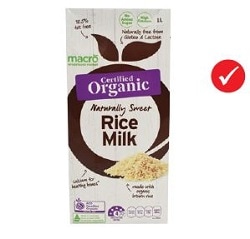
Certified Organic
Naturally Sweet Rice Milk
Cost $2.50 per 1 litre
Per 100ml: 231kJ, 0.7g
protein, 0.1g sat fat,
110mg calcium, $0.25
Nice and creamy with a milk rice taste
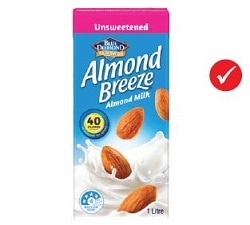
Unsweetened
Almond Milk
Cost $3.59 per 1 litre
Per 100ml: 67kJ, 0.5g
protein, <0.1g saturated fat,
80mg calcium, $0.36
A mild, nutty flavour. Lower in calcium than we recommend.
100ml trim cow’s milk contains around 160kJ, 4g protein, 0.1g saturated fat, 130mg calcium
www.healthyfood.com






